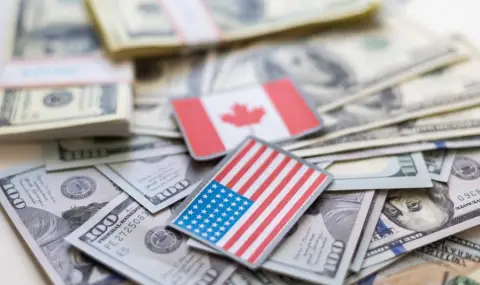The decision of the new US President Donald Trump to impose tariffs on Canadian imports could plunge the country's economy into recession, erasing the growth of the last 3 years, the Globe and Mail newspaper reported, citing a report by the Royal Bank of Canada and analysts' forecasts.
They estimate that the upcoming tariff war between the US and Canada could be the "most serious shock" to trade relations between the two countries since the 1930s. Economists also warn that against this background, the unemployment rate in Canada, which is currently 6.7%, could jump by 2-3 percentage points. In this case, the figure will reach the level it was in the fall of 2020, when much of the country faced a lockdown due to the COVID-19 pandemic.
Bank of Montreal Chief Economist Doug Porter believes that Canada is facing a “moderate recession“ as early as 2025. His colleague from the consulting company RSM Canada, Tu Nguyen, in turn, believes that the country's economy will shrink by 2% in 2025. In this case, the scale of the decline will exceed the 1.8% forecast made by experts before Trump introduced the tariffs.
In addition, the publication notes that Trump's tariffs, even before they come into effect, are already making it difficult for Canadian companies to do business. Thus, a major Quebec-based metals producer, Canam Group, which is involved in the construction of a number of facilities in the United States, is preparing for difficult negotiations with American customers because of the impact of tariffs on contract terms. Other sources say that 10% tariffs on Canadian energy will raise the prices of gasoline, diesel and jet fuel for consumers in the United States.
Trump's tariffs could threaten the supply chain of critical minerals in North America, according to Pierre Gratton, head of the Mining Association of Canada. “These tariffs will disrupt the main flow of minerals and metals, increase the vulnerability of the supply chain and increase the cost of doing business for our customers in the United States,“ he explains.
On February 1, Trump signed an executive order imposing tariffs on goods from Canada, China and Mexico. As stated in the document, 25% tariffs are imposed on imports from Mexico and Canada (10% on Canadian energy resources). Additional 10% tariffs are imposed on goods from China. Trump said that this move was made due to the “serious threat posed by illegal immigrants and deadly drugs, including fentanyl, which are killing“. US citizens. Later, the American leader announced negotiations with the authorities of Canada and Mexico.
The Canadian authorities imposed retaliatory tariffs of 25% on US goods worth a total of 155 billion Canadian dollars (106.5 billion USD). As noted by Prime Minister Justin Trudeau, Ottawa is also considering the possibility of introducing non-tariff retaliatory measures against the US in the field of critical minerals and energy.
